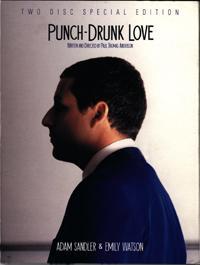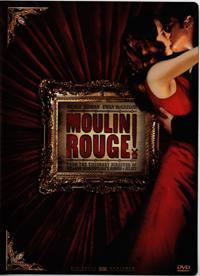Casablanca“Of all the gin joints in all the towns in all the world,” Ilsa has to walk into Rick’s. There are innumerable cinematic love stories, but “Casablanca” is the benchmark. Well-made, traditional, romantic as hell and proud of it, still cool and involving more than 50 years after its initial release, this wartime love triangle still intrigues, entertains and makes hearts skip beats as Rick (Humphrey Bogart) tells Ilsa (an incandescent Ingrid Bergman) that they’ll “always have Paris.”
This is the kind of romance that a guy can watch without feeling mushy, mostly because the lovers play their cards so close to the vest until they no longer can and the emotions spill out, accompanied by Max Steiner’s iconic score. And there’s the Bogie factor, with the actor paving the way for countless imitators of his unique brand of stoical romantic torment. He’s all thorniness and coldness and refuses to “stick his neck out” on the surface, but privately he drinks himself blind and reminisces of better times with his former love. He’s a man’s man and a ladies’ man – a tough, gruff hero with a hidden, open wound of a heart. Oh, and Bergman’s timeless beauty and ethereal screen presence don’t exactly hurt to watch.
There’s intrigue, danger, Nazis, nobility and some of the most oft-quoted dialogue in film history. As Rick puts Ilsa on a plane and into the arms of another man, he is doing what any romantic hero would if he absolutely had to – sacrificing his love for the sake of a greater good. Beat this killer goodbye: “Ilsa, I’m no good at being noble, but it doesn’t take much to see that the problems of three little people don’t amount to a hill of beans in this crazy world. Someday you’ll understand that.” But he can’t let it rest without a verbal kiss. “Here’s looking at you, kid,” he mutters, embracing her fiercely with his gaze.
Through it all winds the voice of Dooley Wilson as Sam, Rick’s loyal friend and barroom pianist, warmly caressing the notes and words of the film’s romantic anthem “As Time Goes By.” “It’s still the same old story,” he croons, “a fight for love and glory, a case of do or die. The world will always welcome lovers, as time goes by.” This is a romance that never gets old; you’ll want to play it again and again and again.
Annie Hall
Though “Annie Hall” is typically considered a romantic comedy, Woody Allen’s shrewd observations and incredible wit keep the film from coming anywhere near the sappiness of love. Instead, Allen picks apart the heartbreak of an ending relationship and juxtaposes it with the happy beginnings, lampooning a multitude of aspects of society along the way.
Many films attempt to relate the differences between men and women, but most only deal with shallow, surface attributes. Allen goes deeper, showing how simple things in a relationship can be taken two completely different ways by the parties involved.
The film’s comedy is pervasive and hilarious, drawn mostly from simple conversation and social interaction. The filming is impeccable, pulling weird little tricks here and there that allow Singer to break the fourth wall in the middle of a scene without missing a beat. In one scene, Singer, Hall and Rob (Tony Roberts) walk through Singer’s old house. As they walk through the halls, they catch glimpses of Singer’s childhood and accept them as if this were an everyday occurrence. With a unique approach to relationships and the people in them, outstanding direction and an appearance by a very young Christopher Walken, “Annie Hall” shouldn’t be missed.
True Romance
The word “romance” is in the title, so it must be a girly movie, right? Wrong. “True Romance” is based on the first screenplay written by Quentin Tarantino, so violence is the standard here, though at its core it’s a love story.
The cast of “True Romance” is one of its strongest points. Christian Slater, Patricia Arquette, Gary Oldman, Samuel L. Jackson, Dennis Hopper, Christopher Walken, James Gandolfini, Brad Pitt and a plethora of faces that cause one to think “Hey, I’ve seen him somewhere before!” fill the screen, and all of them show that they’re good at their jobs.
The romance in the film lies between Slater’s Clarence Worley and Arquette’s Alabama Whitman. Clarence discovers that Alabama is a prostitute, but this doesn’t stop him from falling in love with and quickly marrying her. Don’t think this is another “Pretty Woman,” though. No sooner do the two begin dating than they’ve ripped off a load of cocaine from Alabama’s pimp (Oldman) and set off for Hollywood to cash it in for an early retirement. Unfortunately for them, the people that cocaine can be stolen from aren’t usually very calm about losing it, and the gangsters in “True Romance” fit the mold.
Girls will like the romance, guys will like the action and nearly everyone will appreciate the stellar character work.
All the Real Girls
Director David Gordon Green’s “All the Real Girls” may not have the most original storyline or the subtlest symbols, but, with its raw performances, its beautiful, intimate cinematography, its haunting score and its honest writing, it does something better than any other film this writer has ever seen. Somehow it captures on film the intoxicating, messy feeling of falling in first real love.
Paul, a small-town ladies’ man known for letting exes down hard, knows he’s in over his head when he starts falling, gently and truly, for Noel, the younger sister of his best buddy and “partner-in-crime” Tip. “What are you looking at?” wonders Paul in the film’s opening line. “I’m looking at that bucket,” says Noel, “thinking… I like you.”
Green’s images and dialogue exchanges are pure cinematic poetry – all awkwardness and fragility, with an eye for small, telling moments. Sometimes the exchanges between leads Paul Schneider and Zooey Deschanel feel so personal, so intimate and real, that merely watching them feels like intruding.
These aren’t stock characters, nor is their romance by the book. It’s funny, ugly, heartbreaking and unshakeable in unexpected ways. It consoles with the message that even if a love story ends in tears, the journey one’s heart has taken is one worth making again and again.
Moulin Rouge!
Baz Lurhmann made opera accessible to mainstream audiences with this pop-and-sequins songfest, but he did something more, too – he took a paper-thin, well-worn melodrama and turned it into a dizzying, unforgettable spectacle of booming emotion and unyielding passion.
The plot is simplicity itself – a young poet (Ewan McGregor) falls for a dying prostitute (Nicole Kidman) amid the glitz and decadence of Lautrec-era Paris. Lurhmann knows that he has to sell the material with earnestness, which he does, but he finds a unique solution for connecting the fierce feelings of familiar characters with the jaded, prove-it-to-me sensibilities of the MTV generation. He has his characters sing, a lot, and with ferociousness, humor, style and full-on openheartedness. Not to mention that he has them belting out anachronistic ballads like “I Will Always Love You” and Elton John’s “Your Song.”
Miraculously, the high-wire act succeeds, and more miraculously, it never feels like an ungainly cobbling-together of previous elements. Madonna and Queen songs fit right into the same universe as courtesans and tragic love, and the visceral rush of this brave new world is too much to resist.
As McGregor springs atop the head of an elephant statue singing “Love Lifts Us Up Where We Belong” with a grin a mile wide and eyes afire with idealistic romance, it’s hard to argue him down. Even if the affair is headed for an operatic downer of an ending, “Moulin Rouge!” retains a joyous romanticism that survives everything the story throws at it, from rivalry to jealousy to death to despair; its heart takes a licking and fights back with a song.
Punch-Drunk Love
There’s nothing very romantic about the first half of Paul Thomas Anderson’s loopy ode to honesty, acceptance and frequent flier miles. Barry Egan (Adam Sandler) is the manager of his own novelty plunger business, single, shy, the butt of his clan of sisters’ cruelty and manipulation and a powder keg of long-repressed anger. At a family birthday party, he quietly tells his sisters to stop making fun of him; they refuse, and he calmly walks over to a glass door and smashes it. His only joys in life come from fiddling with an abandoned harmonium left on the curb of the street where he works and collecting proofs of purchase from food items, mostly pudding, that will eventually entitle him to air miles anywhere in the world.
Then he meets Lena (Emily Watson), a friend of one his sisters, and Barry’s small, sad world and the film that contains it blossom. Lena senses the damage in Barry, but it doesn’t scare her away. They both sense the eccentricity and decency in each other that would make them an incredible pair.
Not that the road to romance is without bumps. It’s all the oddness and violence in Anderson’s film that makes the love story that much sweeter and more profound. Deeply flawed people, the film argues, deserve love as much, maybe more, than the synthetically average Joe and Jane in a Kate Hudson rom-com. Anderson’s off-kilter visual flourishes, his willingness to crank broad emotions up to 11 and Jon Brion’s by turns sinister and dreamily whimsical score make the audience so punch-drunk that they have no choice but to give into the splendid insanity of falling head over heels.
Only the stoniest hearts will resist fluttering when Barry climactically channels his rage toward a menacing porn baron (Philip Seymour Hoffman) with these well-chosen words: “I have a love in my life. It makes me stronger than anything you can imagine.”
High Fidelity
Stephen Frears takes an episodic approach to love, comparing relationships to musical trends. Going deeper, “High Fidelity” analyzes the things that cause relationships to go bad and the things that can bring them back together again.
Rob Gordon (John Cusack) is a man defined by his inadequacies, constantly trying to justify his “top five breakups” and why his life has to be the way it is. The obsession he and his cohorts (Jack Black and Todd Louiso) have with music is almost unhealthy, preventing social interaction with all but the most elite musical aficionados.
As the plot unfolds, the three begin to see their own flaws in humorous ways that avoid sap, showing that subtle changes in attitude can repair even the most inflated ego. Jack Black gives one of his funniest performances, avoiding pure slapstick idiocy for deeper character-based laughs. Cusack’s narration is highly untrustworthy with great results, revealing a man who’s unwilling to accept any of his flaws in an attempt to feel as depressed as the singers he listens to.
With a great soundtrack and a non-cheesy happy ending, “High Fidelity” holds steady as one of the best comedies of the decade.
Seven make-out movies perfect for Valentine’s Day

Donate to The Reflector
Your donation will support the student journalists of Mississippi State University. Your contribution will allow us to purchase equipment and cover our annual website hosting costs.
























































































